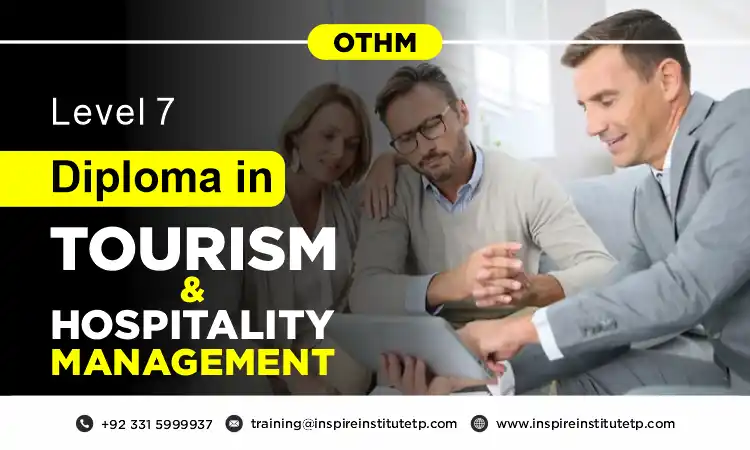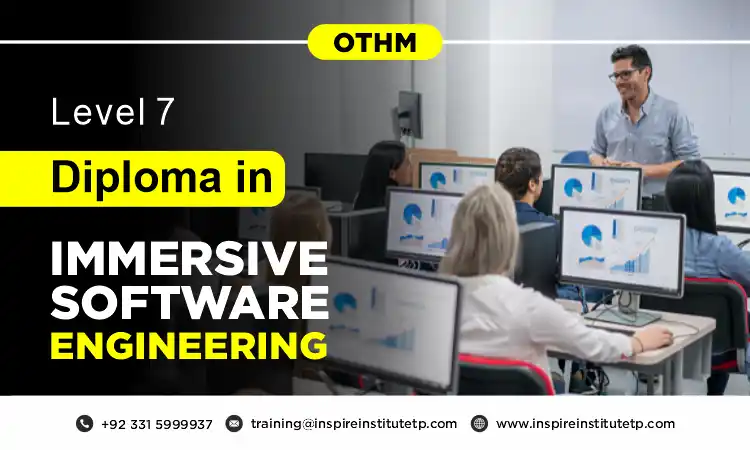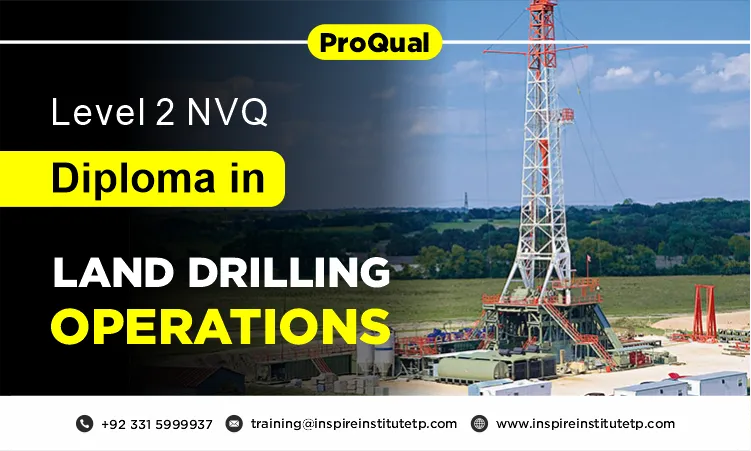OTHM Level 7 Diploma in Tourism and Hospitality Management
The OTHM Level 7 Diploma in Tourism and Hospitality Management is an advanced qualification designed for professionals seeking to enhance their expertise in the dynamic fields of tourism and hospitality. This diploma focuses on developing strategic management skills and a comprehensive understanding of the industry’s best practices, including sustainable tourism, service quality, and global trends.
Ideal for aspiring managers and leaders, the program covers essential topics such as marketing, finance, operations, and customer relationship management within the tourism and hospitality sectors. By combining theoretical knowledge with practical application, the OTHM Level 7 Diploma prepares graduates for successful careers in various roles, equipping them with the skills necessary to thrive in a competitive global environment.
Why Choose this Qualification
Choosing the OTHM Level 7 Diploma in Tourism and Hospitality Management offers several key advantages:
- Advanced Industry Knowledge: The diploma provides in-depth insights into the tourism and hospitality sectors, equipping learners with the knowledge necessary to understand and navigate industry challenges and opportunities.
- Career Advancement: This qualification enhances employability and prepares individuals for leadership roles in various sectors, including hotels, travel agencies, event management, and tourism organizations.
- Strategic Management Skills: The program emphasizes strategic thinking and decision-making, empowering graduates to develop and implement effective management strategies in a competitive environment.
- Focus on Sustainability: With a growing emphasis on sustainable tourism practices, the course prepares learners to promote environmentally and socially responsible practices within the industry.
- Practical Application: The curriculum includes case studies and real-world projects, allowing students to apply theoretical concepts to practical scenarios, enhancing their readiness for the workforce.
- Global Recognition: OTHM qualifications are recognized internationally, providing graduates with a competitive edge in the global job market.
- Networking Opportunities: Students have the chance to connect with industry professionals, peers, and experts, expanding their professional network and potential career connections.
By choosing the OTHM Level 7 Diploma in Tourism and Hospitality Management, individuals position themselves for success in a vibrant and evolving industry.
Course Overview
Ofqual Regulated Qualification
Course Level: Level 7
Average Completion Time:
6-18 Months
Required Credits: 120
Evidence & Assignment Based
Qualification Structure
The OTHM Level 7 Diploma in Tourism and Hospitality Management consists of 6 mandatory units for a combined total of 120 credits, 1200 hours Total Qualification Time (TQT) and 600 Guided Learning Hours (GLH) for the completed qualification.
Mandatory Units
Optional Units
Who Should Take This Course
The OTHM Level 7 Diploma in Tourism and Hospitality Management is suitable for:
- Aspiring Managers: Individuals looking to advance into managerial or leadership positions within the tourism and hospitality sectors.
- Current Professionals: Those already working in tourism or hospitality who want to enhance their knowledge, skills, and qualifications to progress in their careers.
- Graduates: Individuals with a relevant undergraduate degree in hospitality, tourism, or business who seek to specialize further and gain advanced expertise.
- Career Changers: Professionals from other industries who are looking to transition into tourism and hospitality, providing them with the necessary knowledge and credentials to enter the field.
- Entrepreneurs: Individuals interested in starting their own tourism or hospitality ventures and wanting to acquire the skills needed for successful business management.
- International Students: Those from around the world seeking a globally recognized qualification to enhance their employability in the tourism and hospitality sectors.
This course is designed for anyone eager to deepen their understanding of tourism and hospitality management while advancing their professional career.
Course Benefits
Here are the course benefits for the OTHM Level 7 Diploma in Tourism and Hospitality Management presented in bullet points:
- Flexible Learning Options: Offers flexibility in study modes, accommodating working professionals and diverse learning preferences.
- Comprehensive Knowledge: Gain a thorough understanding of key concepts, theories, and practices in tourism and hospitality management.
- Enhanced Leadership Skills: Develop strategic thinking and leadership abilities to effectively manage operations and make informed decisions.
- International Recognition: The diploma is globally recognized, improving job prospects and facilitating career advancement in various roles.
- Career Advancement: Prepare for senior management positions, consultancy roles, or entrepreneurial ventures within the tourism and hospitality sectors.
- Networking Opportunities: Connect with industry professionals and peers, fostering valuable relationships that can lead to job placements and collaborations.
- Research and Analytical Skills: Engage in practical assignments that enhance critical thinking and problem-solving capabilities.
- Pathway for Further Education: Provides a solid foundation for pursuing advanced academic qualifications, such as a master’s degree in related fields.
- Industry-Relevant Curriculum: The course content is designed to meet the current needs and trends of the tourism and hospitality industries.
Eligibility Criteria
Entry Requirements: Candidates must possess an honours degree in a related subject, a UK Level 6 diploma, or an equivalent overseas qualification.
Mature Learners: Individuals with management experience may also be considered for admission. It is essential for these learners to confirm their eligibility with the delivery center before registering for the program.
Age Requirement: Applicants must be at least 21 years old at the start of the course.
English Language Proficiency: Learners from non-majority English-speaking countries are required to provide proof of English language competency to ensure they meet the course standards.
FAQs
The Qualification Process
Here is a step-by-step guide to help you understand the entire journey from pre-registration to certification:
- Self-Assessment:
Begin by evaluating your eligibility for the course. Ensure you meet the entry requirements, such as relevant qualifications or professional experience, as outlined for the program. - Registration:
Complete your registration by submitting the required documents, including a scanned copy of a valid ID, and pay the necessary registration fee. This is your first official step in the qualification process. - Induction:
An assessor will conduct an induction session to verify your eligibility and introduce you to the evidence requirements. During this stage:- If the assessor finds that you meet all the necessary criteria, you will proceed to the next step.
- If you do not meet the entry requirements, your registration will be canceled, and your fee will be refunded.
- Evidence Submission:
Based on the assessment criteria, you will need to submit evidence demonstrating your knowledge and competence. Consult with your assessor if you need clarification on the type and nature of the evidence required. This evidence could include assignments, projects, case studies, or professional experiences related to sustainability management. - Feedback and Revision:
The assessor will review your submitted evidence and provide feedback. Evidence that meets the required criteria will be marked as “criteria met.” If there are any gaps, the assessor will highlight them, and you will need to address those gaps by revising and resubmitting the evidence. - Competence Evidence:
Submit your final evidence demonstrating that you have successfully achieved all the learning outcomes. The assessor will mark your submission as “Criteria met” once everything is up to standard. - Internal Quality Assurance (IQA):
After your evidence is approved by the assessor, the Internal Quality Assurance Verifier (IQA) will review it to ensure that the assessment was carried out consistently and according to ProQual standards. - External Verification:
The IQA then presents your portfolio to OTHM’s External Quality Assurance Verifiers (EQA) for final confirmation. The EQA may contact you directly to verify the authenticity of your evidence. - Certification:
Once all internal and external checks are completed to satisfaction, OTHM will issue your official certificate, confirming that you have successfully achieved the qualification.
This comprehensive process ensures that learners demonstrate all necessary competencies and meet the high standards required for the OTHM Level 7 Diploma in Tourism and Hospitality Management.







